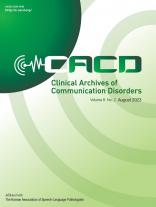Attention-Controlled Working Memory Measures to Assess Listening Effort
- 한국언어재활사협회
- Clinical Archives of Communication Disorders
- Vol.2 No.2
-
2017.08163 - 177 (15 pages)
- 6

Purpose: To assess working memory (WM) performance using novel tasks that included controlled-attention functions of updating of information, selective attention, task monitoring, and multiple task coordination as well as relating performance to perceived listening effort. Methods: Sixteen adults with normal hearing participated in two tasks:1) the attention switching (AS) task that required participants to categorize digits rapidly and recall totals of each category and 2) the working memory span task (WMST) that involved storing and recalling digits while performing a secondary sentence verification task. Each experiment was conducted in quiet and in multi-talker babble. Results: In the AS task, performance was worse when noise was added and when digit categories changed. In the WMST, digit recall accuracy was worse in noise, but reaction times (RTs) were not affected. Conclusions: The results of this experiment show that accuracy and RT performance on auditory cognitive tasks generally worsens in background noise, even when intelligibility remains high. This suggests that background noise increases WM load and the decline in performance can be interpreted as an increase in listening effort. The specific integration of attentional control in these tasks, especially the AS task, may 1) have increased the sensitivity over traditional WM tasks and 2) allow for the ability to differentiate between peripheral and central mechanisms.
INTRODUCTION
MATERIALS AND METHODS
RESULTS
DISCUSSION
RESULTS
DISCUSSION
(0)
(0)